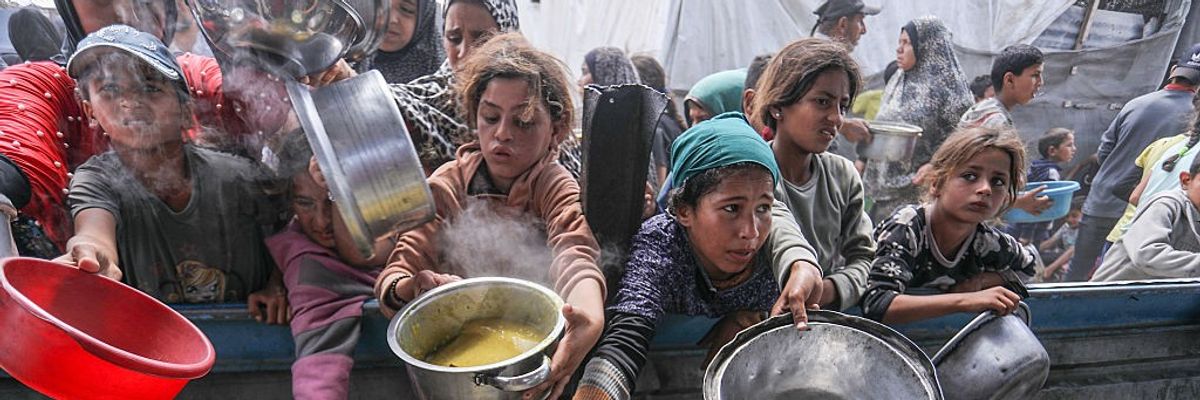Jon Queally
What
the Israeli government is planning is "not an aid plan," said one
legal scholar, but rather "an aid denial plan."

Displaced Palestinians, including
children, crowd to receive hot meals distributed by charities in the
Al-Mawasi area of Khan Yunis, southern Gaza, on May 3, 2025. The food
distribution comes amid Israel's ongoing attacks and blockade, which
have led to a deepening humanitarian crisis in the Gaza Strip. (Photo by Abed Rahim Khatib/Anadolu via Getty Images)
Despite global
outcry to end the "genocidal" assault on the people of Gaza, Israeli
cabinet ministers early Monday approved a plan that could lead to the capture
of the "entire Gaza Strip," prompting fresh warnings of a complete
ethnic cleansing of the enclave coupled with outrage over a proposal to use
U.S.-based mercenaries to be part of distribution of humanitarian aid.
One Israeli
official familiar with the shift in military tactics toldHaaretz that Israel
Prime Minister Benjamin Netanyahu made clear to his Security Cabinet that the
new approach in Gaza will be different from what's been going over the previous
18 months in that it will shift from what were described as "raid-based
operations" to "the occupation of territory and a sustained Israeli
presence in Gaza."
Another unnamed
Israeli official told Agence France-Press that the plan "will include,
among other things, the conquest of the Gaza Strip and the holding of the
territories, moving the Gaza population south for their protection."
To support the
occupation plan, the Israeli army, with the approval of the Security Cabinet,
will be calling up tens of thousands of reservist soldiers, in the words of the
IDF, to "intensify the pressure" on Hamas and "expand and
intensify" operations in Gaza.
According to
the Associated Press:
“The new plan, which the officials said was meant to help Israel
achieve its war aims of defeating Hamas and freeing hostages held in Gaza, also
would push hundreds of thousands of Palestinians to southern Gaza, what would
likely exacerbate an already dire humanitarian crisis.
Since a ceasefire between Israel and Hamas collapsed in mid-March,
Israel has unleashed fierce strikes on the territory that have killed hundreds.
It has captured swathes of territory and now controls roughly 50% of Gaza.
Before the truce ended, Israel halted all humanitarian aid into Gaza, including
food, fuel and water, setting off what is believed to the be the worst
humanitarian crisis in nearly 19 months of war.
The ban on aid has prompted widespread hunger and shortages have
set off looting.”
In addition to
expanded military operations, the Israelis also presented a new approach to
distribution of aid on Sunday that would include the use of private military
contractors, also known as mercenaries. By relocating the civilian population
to the south and forcing people to travel for food, water, and medicine only to
designated "hubs" for relief, humanitarians said the plan violates
all principles of human rights and the laws of war.
The Washington
Postreports Monday that "American contractors" would be used to carry
out the plan, which was presented to officials in the Trump administration on
Friday.
According to
the Post, "two U.S. security companies are expected to be contracted to
handle logistics and provide security along initial distribution corridors and
in and around the hubs."
“The companies, Safe Reach Solutions and UG Solutions, organized
and staffed a vehicle checkpoint along a major north-south road through Gaza
during the ceasefire.
SRS, which is to handle planning and logistics, is headed by Phil
Reilly, a former CIA senior intelligence officer with extensive overseas
service who has held senior positions in other private security companies. SRS
is to subcontract on-the-ground security operations to UG Solutions, headed by
Jameson Govoni, a former Green Beret whose service from 2004 to 2015 included
tours in Iraq and Afghanistan. The security contractors are to be armed and
have their own force protection. They will not have detention authority.”
In response to
the new distribution plan, the coalition of United Nations and NGOs operating
in Gaza, known as the Humanitarian Country Team (HCT), which operates within
the U.N. Office of Coordination for Humanitarian Affairs (OCHA), issued a harsh
rebuke to the Israelis, saying that the proposal "contravenes fundamental
humanitarian principles and appears designed to reinforce control over
life-sustaining items as a pressure tactic–as part of a military
strategy."
"The
design of the plan presented to us will mean large parts of Gaza, including the
less mobile and most vulnerable people, will continue to go without
supplies," said the HCT in its statement. "It is dangerous, driving
civilians into militarized zones to collect rations, threatening lives,
including those of humanitarian workers, while further entrenching forced
displacement."
The group added
that both the U.N. Secretary-General and the Emergency Relief Coordinator in
Gaza "have made clear that we will not participate in any scheme that does
not adhere to the global humanitarian principles of humanity, impartiality,
independence and neutrality." Instead of the plan presented by the
Israelis, the HCT called for an end to the imposed blockade so that neutral
relief agencies could bring in the necessary supplies to the suffering
population in Gaza.
Jan Egeland,
secretary general of the Norwegian Refugee Council (NRC), which helps
distribute aid in Gaza and was presented with the plan, decried the proposal.
"After two
months of devastating blockade and starvation of Gaza, Israeli officials demand
that we shut down the universal aid distribution system run by the UN and NGOs
like NRC," said Egeland. "They want to manipulate and militarize all aid
to civilians, forcing us to deliver supplies through hubs designed by the
Israeli military, once the government agrees to re-open crossings."
Adil Haque, law
professor at Rutgers University and director of Just Security, said what the
Israeli government is planning is "not an aid plan," but rather
"an aid denial plan"—one that "makes a mockery of international
humanitarian law."

No comments:
Post a Comment